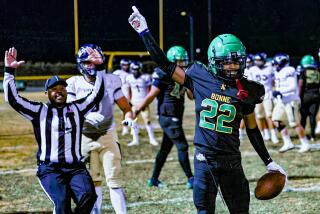Kansas Hit With 3-Year Probation : NCAA Punishes Jayhawks for Recruiting Violations
- Share via
MISSION, Kan. — Kansas, the defending National Collegiate Athletic Assn. basketball champion, received a 3-year probation Tuesday for recruiting violations and will be barred from defending its NCAA title.
The NCAA cited major violations that included improper recruiting contacts and improper travel payments by either former coach Larry Brown or members of his staff. Brown left Kansas after leading the Jayhawks to the national title to become coach of the National Basketball Assn.’s San Antonio Spurs, taking his entire coaching staff with him.
The Jayhawks also will not be allowed to give paid campus recruiting visits in 1989 and will be stripped of one scholarship for the 1989-90 academic year.
The NCAA considered imposing the most extreme sanction--the so-called death penalty--which would have shut down the basketball program for a year. Only Southern Methodist’s football program has received such punishment.
“Kansas was on the bubble, so to speak,” David Berst, assistant NCAA director for enforcement, said. “I’m sure there was a lot of discussion on that point, but no severe violations involved any of the players who were on the team. It was a tough decision.”
Berst, however, told The Times that the punishment leveled against Kansas sends a strong message nationally that infractions will be dealt with severely.
“People should get away from that naivete of the past,” he said. “We’re in a situation where more severe penalties are going to be imposed, especially when intentional violations have occurred.”
The report by the Infractions Committee said the 2-year investigation was initiated after a telephone call from an informant alerted them to possible violations in the recruitment of a transfer.
Reports have linked former Memphis State guard Vincent Askew to the probe although the NCAA did not identify anyone. Askew was recruited by Brown and spent the summer of 1986 on campus. He then returned to Memphis without playing for the Jayhawks.
Kansas officials Tuesday identified Askew as key to the investigation.
Brown, who left Kansas last spring after apparently accepting, then rejecting, an offer from UCLA, said during a news conference at San Antonio that he was “sorry that the present players and staff must suffer the consequences of these penalties.”
Brown, addressing the Askew matter, said the report mentioned “a kid visiting his grandmother because she was ill. I gave him exactly $364, which was the price for the round-trip ticket and we told the NCAA about it. The kid’s grandmother who raised him passed away a short time later.
“I’d give it to anybody if they told me his grandmother was passing away,” Brown said. “It was something I wasn’t trying to hide.
“The bottom line is we know what expense (the NCAA) went to and how much time they (spent trying) to figure out the things that we were doing and to see if there was any pattern and they couldn’t find anything.”
Milt Newton, a senior forward and key member of the team that beat Oklahoma, 83-79, in last April’s NCAA final, broke down during a news conference on the Lawrence, Kan., campus and left the room. He returned a few minutes later to say the probation “hit me like a ton of bricks.”
“I thought I wasn’t going to be seriously affected by it, but I am,” Newton said. “We still have a couple of goals to shoot for like winning the conference and the Big Eight tournament. I think it will make us play harder.”
Roy Williams, Kansas’ new coach from North Carolina, told the Kansas City Star: “I’m extremely disappointed for this year’s team. We’re going to have to fight because when you say probation for 3 years, that’s what the other schools are going to bring up when they are recruiting.”
Bob Frederick, Kansas athletic director, said the university will not appeal the decision.
“We are obviously disappointed with the penalties, but we accept them,” he said. “It’s time to put the past behind us.”
The Kansas football program served a 2-year probation from 1984-85 and newly enacted NCAA legislation specifies that when a school is convicted of two major violations within 5 years, the second sport penalized is subject to suspension.
Kansas officials, however, had no idea the program was close to receiving the “death penalty.”
D. Alan Williams of Virginia, chairman of the Infractions Committee, declined to elaborate on the written news release.
“The committee believes, however, that the following unique circumstances were present in this case,” the statement said. “The violations, while serious and calculated to obtain a recruiting advantage . . . were isolated to a 10-day period and the investigation revealed no other serious violations in the basketball program; the basketball program was not involved in the 1983 football case.”
The NCAA said violations included improper inducements with a total value of at least $1,244 to the recruit, including clothing and airline tickets.
Kansas could still play in the Big Eight postseason tournament, which decides the conference’s automatic qualifier to the NCAA Tournament, if other Big Eight schools agree.
The prohibition against bringing recruits for a visit next year could “be a killer,” Iowa State coach Johnny Orr said.
“How are they going to get somebody to come to their school if they can’t bring them on campus for a visit?” Orr asked. “It’s a touchy situation. The bad thing is nothing will happen to the people who committed the wrongdoing. But I would definitely vote to let them play in our tournament next year.”
More to Read
Go beyond the scoreboard
Get the latest on L.A.'s teams in the daily Sports Report newsletter.
You may occasionally receive promotional content from the Los Angeles Times.










